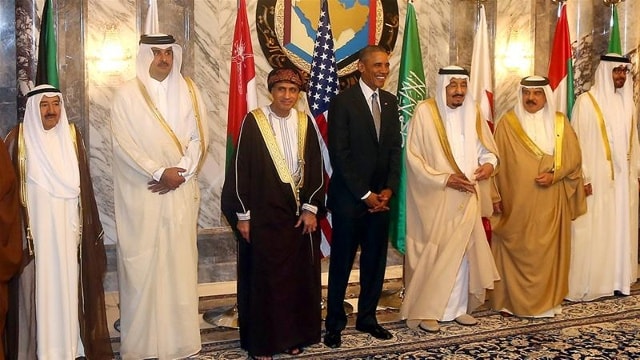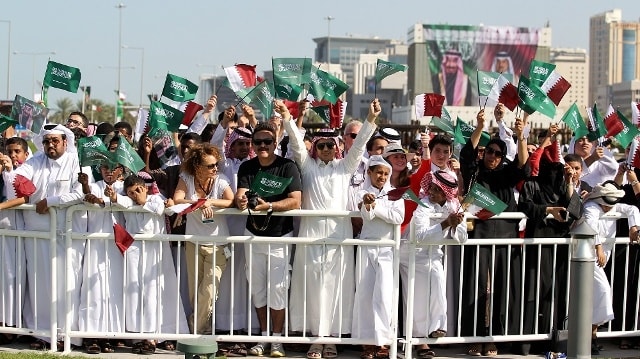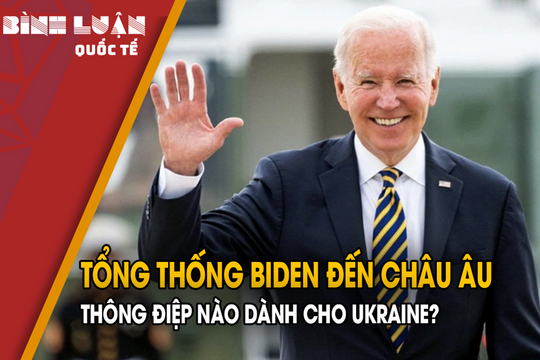'Qatar crisis' and signs of disintegration in the Gulf
(Baonghean.vn) - According to Foreign Affairs magazine, the diplomatic crisis between Qatar and Arab countries in the region shows that the rifts between countries in the Gulf Cooperation Council (GCC) are not easy to resolve.
 |
| UAE citizens are banned from traveling to or staying in Qatar. Photo: Getty |
On June 5, Saudi Arabia, the United Arab Emirates (UAE), and Bahrain announced the withdrawal of their ambassadors from Qatar, unanimously accusing Doha of violating a provision in the GCC Charter prohibiting member states from interfering in the internal affairs of other countries in the bloc. This unprecedented decision in the history of the GCC indicates important changes to come for this organization, as well as the balance of power in the Gulf.
The dispute between the GCC member states has been going on for a long time and it was only a matter of time before it flared up. At the December 2016 GCC summit in Kuwait, Saudi Arabia and the UAE almost succeeded in condemning Qatar for “financing” terrorism in Syria and other countries. At the last minute, the Riyadh government withdrew its intention, not wanting to embarrass the host country Kuwait. Instead, Saudi Arabia issued a separate warning to Qatar.
A few weeks earlier, Saudi leaders had rebuked Qatar’s Crown Prince Emir Sheikh Tamim in a meeting in Riyadh arranged by Kuwaiti leader Sheikh Sabah Al Ahmad. Tamim was asked to make real changes in foreign policy, including ending financial support for groups linked to al-Qaeda in Syria. The Qatari crown prince reportedly agreed, but with the condition that more time be given to change.
 |
| The continued Gulf crisis will empower Iran in the region. Photo: Reuters |
Ultimately, Prince Tamim sought to reduce Doha’s involvement in the Syrian conflict. But when Qatar realized it was losing its foothold in Syria, it immediately stepped up its efforts to connect with the Muslim Brotherhood and its regional affiliates, including Hamas. It also continued to build ties with Iran and Türkiye, supported Houthi rebels in Yemen, and tested its connection with Hezbollah. This action angered Saudi Arabia and the UAE, both of which were trying to eliminate the influence of the Brotherhood.
Not surprisingly, Bahrain, the UAE, and Saudi Arabia immediately accused Qatar of trying to undermine the GCC and recalled their ambassadors. How will Qatar respond? There are two options for Prince Tamin, and both are bad. The Qatari Crown Prince can accept the demands of Saudi Arabia and the UAE, but this means losing his relationship with the “old guard”, including his father. Or Tamin can strengthen his position by cooperating with his father’s allies to once and for all dare to affirm that he does not accept Riyadh’s influence and an increasingly unresponsive GCC.
Mr Tamin may not survive the first scenario, as it would be difficult to face not only his family but also the influential former Prime Minister and Foreign Minister Hamad Bin Jassim Al Thani. But the second scenario is not so easy either.
In this scenario, Qatar would be forced to ally with Iran, with whom it has established strong economic ties. Qatar would also have to seek economic and political ties with Oman, which has good relations with Tehran. This move would also come at a cost to Qatar. Oman does not want trouble from the GCC by refusing to comply with the group’s standard line against Iran. As a member of the GCC, it would be difficult for Qatar to reverse course with the organization. If Qatar were to become close to Iran, Oman would signal the end of the GCC and the opening of a new power alliance in the Gulf.
 |
| Qatari residents welcome Saudi King Salman during his visit to the capital Doha in December 2016. Photo: Reuters |
The rift between Qatar and its neighbors Saudi Arabia and the UAE also puts the US in a dilemma. With strategic relations with all three countries, it is difficult for Washington to coordinate cooperation when Qatar, Saudi Arabia, and the UAE do not speak with one voice. It is very possible that Riyadh and Abu Dhabi will lobby the US to help stop Doha's money from flowing out under the guise of fighting terrorism. But the US will have to consider carefully because Qatar is home to the Al-Udeid Air Base and the US Joint Air and Space Command Center - the focal point for coordinating all reconnaissance and air strikes of the US Air Force in the wars in Iraq and Afghanistan.
In other words, the US Treasury and State Departments may be willing to respond to sanctions on Doha as proposed by Saudi Arabia and the UAE, but the Pentagon would be the one to put the brakes on any such plans.
The departure of the Saudi, UAE, and Bahraini ambassadors from Qatar in the coming days is likely to trigger urgent consultations among the Gulf Arab states. This step may lead to some kind of political solution to the crisis. But make no mistake. This is a new political era in the Gulf, in which individual states are pursuing their own course, and the idea of a unified organization is gradually fading away, despite Saudi Arabia’s efforts./.
Lan Ha
(According to Foreign Affairs)
| RELATED NEWS |
|---|

.png)






